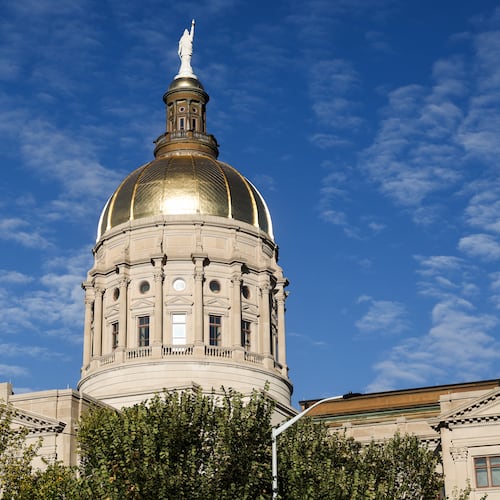The Biden administration’s decision to grant a nearly $6 billion loan to jump-start construction of an electric vehicle plant in northeast Georgia resurfaces a lingering divide over federal green energy incentives between two rivals who could face off in 2026.
Gov. Brian Kemp hailed electric vehicle startup Rivian’s 2021 promise to build a $5 billion factory as a testament to Georgia’s business-friendly ecosystem while blasting the Democratic-backed incentives that help fuel the growing industry.
As the project stalled amid Rivian’s challenges to reach profitability, raising the possibility that the sprawling site near Social Circle would remain a costly eyesore for the indefinite future, Democratic U.S. Sen. Jon Ossoff said he “leapt into action” to cement the loan.
“Had we not taken these steps, there was a real risk that this vital project for Georgia’s future might not have restarted, might not have entered production,” said Ossoff, “and the billions of Georgia taxpayer dollars committed to this project could have gone to waste.”
The back-and-forth over Rivian could be a prelude to a sharp economic campaign clash in 2026 if the term-limited governor decides to challenge Ossoff, who is up for a second term.
It also underscores a broader divide over the fate of lucrative clean energy tax breaks that has fueled a spate of investments in Georgia but could be rescinded under the incoming administration of President-elect Donald Trump, who has labeled the Biden incentives a “green new scam.”
Kemp has similarly assailed the law, which includes tax breaks of up to $7,500 a vehicle for EV buyers, as a “reckless tax and spending spree” that tilts the marketplace in favor of certain manufacturers by “picking winners and losers.”
With this week’s loan, though, one of Kemp’s signature economic development deals is one of those “winners.” And Democrats made clear they will tie the law, known as the Inflation Reduction Act, to Rivian and other Georgia projects that stand to benefit.
“There was real concern last spring that construction might never restart at the Rivian site. There was real concern last spring the thousands of jobs promised by this development might never be created,” said Ossoff, who called the loan a “major step forward.”
Credit: AJC
Credit: AJC
In a statement, Kemp’s office carefully avoided praise of the White House’s loan guarantee and instead highlighted the state’s “nationally acclaimed business environment.”
“Our conversations to bring their operations to the No. 1 state for business predates the current administration in Washington,” said Kemp spokesman Garrison Douglas, “and our shared vision to bring opportunity to Georgia will remain no matter who resides in the White House or what party controls Congress.”
His office noted that California-based Rivian had previously promised to create 7,500 jobs by the end of 2030. Under the terms of the new loan, Rivian expects to start production of new EVs in Georgia in 2028, but details for resuming construction weren’t made public.
Kemp and his staff have sought to minimize the role of federal incentives in the high-stakes world of economic recruiting.
It said Rivian and 53 of the other 59 e-mobility projects in Georgia unveiled in recent years were either announced before the green energy incentives became law or were connected to a project announced prior to the law taking effect.
Credit: Miguel Martinez
Credit: Miguel Martinez
Kemp was already under fire from some local Republicans for his role in the $1.5 billion public incentive package dangled to Rivian to subsidize the project, which included about $125 million for land and training costs for the site.
And he could be forced to continue to walk a tightrope over the incentives next year if Trump follows through on promises to kill federal tax credits for EV purchases and rollback fuel economy rules designed to spark the growing industry.
Credit: Natrice Miller/AJC
Credit: Natrice Miller/AJC
Ossoff, for his part, made clear that preserving the clean energy tax incentives will be a cornerstone of his legislative agenda under a Trump administration — and, just as likely, his reelection message as he campaigns for a second term.
“I’ll oppose any effort to undermine Georgia’s economic development,” the Democrat said, “and I would call upon state and federal leaders in Georgia — whether Democrat or Republican — to stand up and fight for Georgia’s economic future.”
Cox Enterprises, which owns The Atlanta Journal-Constitution, also owns about a 3% stake in Rivian.
About the Author
Keep Reading
The Latest
Featured





